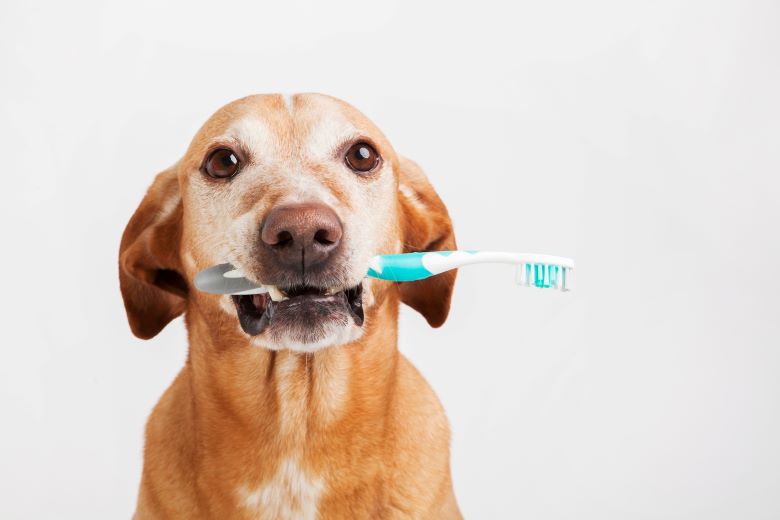
Maintaining the overall health of your furry friend involves more than just feeding and taking them for walks.
Like humans, dogs require proper dental care to prevent health issues and ensure a high quality of life. Neglecting your dog’s dental health can lead to more than just bad breath. It can result in serious health complications.
However, integrating dental care into your dog’s routine doesn’t have to be a struggle. Even something as simple as dog dental chews can make a significant difference in your pet’s oral hygiene.
So, let’s figure out how prioritizing dental health can transform your dog’s life and explore the solutions that make dental care effortless and effective.
Understanding Dental Health In Dogs
Dental health is a crucial—yet often neglected—aspect of your dog’s overall well-being. A dog’s mouth can harbor bacteria, leading to plaque and tartar buildup. Without proper care, these can progress to periodontal disease, a common dental condition in dogs.
Periodontal disease starts when plaque forms on the teeth and hardens into tartar. If not removed, tartar can spread under the gumline, causing inflammation known as gingivitis.
The bacteria from periodontal disease can enter your dog’s bloodstream, potentially affecting the heart, liver, and kidneys. This can lead to serious health complications, making dental health a matter of not just comfort but overall health.
Your dog’s inability to communicate pain complicates matters. Dogs often hide discomfort, meaning dental issues might go unnoticed until they become severe. Therefore, understanding and proactive care are vital.
Regular dental check-ups, proper dental hygiene practices at home, and being alert to signs of dental distress are fundamental steps in protecting your dog’s health.
Choosing The Right Dental Treats
Selecting the right dental treats for your dog is crucial. Start by examining the ingredients. Look for treats free from artificial colors and preservatives. Natural ingredients are gentler on your dog’s digestive system and overall health.
Size matters, too. Ensure the treat is appropriate for your dog’s size and breed. A treat too small might pose a choking hazard, while a large one could be overwhelming for smaller breeds.
Also, consider your dog’s age and chewing habits. Puppies and senior dogs may need softer options, while adult dogs can handle firmer chews.
Check the product’s dental health claims. Look for treats approved by reputable veterinary organizations. These are usually tested for effectiveness in reducing plaque and tartar.
Be mindful of calorie content. Dental treats should not significantly increase your dog’s daily calorie intake. Overfeeding can lead to weight gain and associated health issues.
Lastly, observe your dog’s reaction to the treat. The right choice should be one that they enjoy and can chew comfortably.
If your dog shows any signs of gastrointestinal distress, consider trying a different brand or type, like cannabis treats. You can also ask your vet for some recommendations based on your dog’s specific health needs and dietary restrictions.
Establishing A Dental Care Routine
Establishing a dental care routine is essential for your dog’s health. Start by choosing a specific time each day for dental care. Begin with short sessions, gradually increasing the duration as your dog gets comfortable.
First, introduce a dog-specific toothpaste. Let your dog taste it and get used to the flavor. Then, using a dog-friendly toothbrush or finger brush, gently brush your dog’s teeth. Focus on the gum line, where plaque tends to accumulate. Brush in circular motions, ensuring you reach all the teeth, including the back molars.
Incorporate dental chews into the routine. Offer them after meals or as a daily treat. These chews help reduce plaque and tartar buildup, complementing the brushing routine. Monitor your dog while they chew to ensure they don’t swallow large pieces.
Remember, patience is key. If your dog resists, don’t force it. Try again later, and always praise and reward your dog after each session. This positive reinforcement makes dental care a pleasant experience for your dog.
Regular Vet Visits And Dental Check-Ups
Regular vet visits are a cornerstone of your dog’s health. These check-ups play a critical role in maintaining not only their overall well-being but also their dental health.
During these visits, your vet will conduct a thorough examination of your dog’s mouth. This includes checking for any signs of dental issues, such as plaque and tartar buildup, gum disease, or loose teeth.
Your vet’s expertise is invaluable. They can spot problems that might go unnoticed at home. If issues are found, your vet can provide immediate care or recommend a treatment plan. This proactive approach can prevent minor issues from becoming major health concerns.
Your vet is also your best resource for advice on dental care routines and products. They can recommend specific dental chews, diets, or brushing techniques tailored to your dog’s unique needs.
Remember, prevention is better than cure. Regular vet visits and dental check-ups are investments in your dog’s health, ensuring they stay happy and healthy for years to come.
Parting Thoughts
Taking care of your dog’s teeth isn’t just about avoiding bad breath. It’s about preventing serious health issues and ensuring a long, joyful life together. Start today, and see the difference it makes in your dog’s life.


